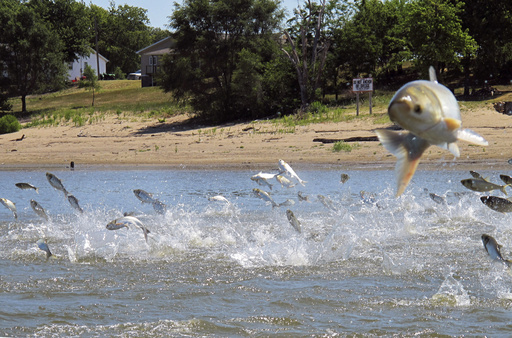
MADISON, Wis. — The $1.2 billion initiative aimed at preventing invasive carp from infiltrating the Great Lakes has been postponed by Illinois Governor JB Pritzker for several months. Pritzker expressed concerns regarding the potential lack of federal funding from the Trump administration, which could leave Illinois responsible for hundreds of millions, effectively incurring a financial burden on the state.
For years, Illinois, Michigan, and the U.S. Army Corps of Engineers have collaborated on this critical project, which aims to establish various technologies along the Des Plaines River, close to Joliet, to keep invasive carp from migrating into Lake Michigan. The Bipartisan Infrastructure Law designated approximately $226 million in federal funds for this effort. Additionally, last year, congressional representatives from Illinois and Michigan successfully included provisions within the Water Resources Development Act that guarantee 90% of post-completion operational and maintenance costs would be funded by the federal government.
Despite plans for a groundbreaking ceremony to take place on Tuesday, Illinois Department of Natural Resources Director Natalie Phelps Finnie sent a letter on behalf of the Pritzker administration to the Army Corps, delaying the transfer of property necessary for the project until at least May. State officials are seeking written confirmation that the promised federal funding will actually be available. The Trump administration had previously issued a memo in January that temporarily halted federal grants and loans pending a review to ensure compliance with specific executive orders relating to climate change and diversity initiatives.
This temporary grant freeze created considerable upheaval; although the administration lifted the memo shortly after it was issued, funds for essential programs such as early childhood education and pollution control remain stalled. Nearly two dozen Democratic-led states, including Illinois and Michigan, are pursuing a federal lawsuit to expedite access to these funds, and a judge recently ordered the administration to act swiftly to unfreeze all financial assistance.
Governor Pritzker, a Democrat and harsh critic of Trump’s policies, highlighted that Illinois has already lost out on $117 million in federal grants for its Department of Natural Resources, resulting in the suspension of 70 infrastructure initiatives. Consequently, Pritzker feels it is his duty to safeguard Illinois taxpayers from potential financial repercussions if the promised federal support fails to materialize.
While the governor’s decision means a halt on significant technological installation work for the project, some preparatory tasks will still proceed, according to Allen Marshall, a spokesperson for the Army Corps of Engineers. Don Jodrey, the federal affairs director for the Alliance for the Great Lakes, has pointed out that even a delay of a few months may seem minor considering the project is not expected to reach completion until 2032. However, Jodrey is worried that escalating political tensions could threaten the project’s viability in the long term.
The threat of invasive carp to the Great Lakes ecosystems is severe. These four species were brought to the U.S. from Asia during the 1960s and 1970s for use in sewage treatment ponds and aquaculture but eventually escaped into the Mississippi River, spreading northward into various tributaries. Experts have long argued about the best strategies to halt their advance towards the Great Lakes, where they pose a risk of outcompeting native fish for food and habitat. The fishing industry in this region is valued at approximately $7 billion.
The proposed project would enhance existing fish-repelling measures in a shipping canal, adding a new layer of protection at the Brandon Road Lock and Dam along the Des Plaines River. Plans include creating bubble curtains, electric fields to deter and stun carp, emitting sound frequencies to confuse the fish, and utilizing bubbles to dislodge nuisance species from barge hulls. Scott Bowen, the director of Michigan’s Department of Natural Resources, emphasized the need for continuous progress on this initiative to safeguard the fishing industry of the Great Lakes.

